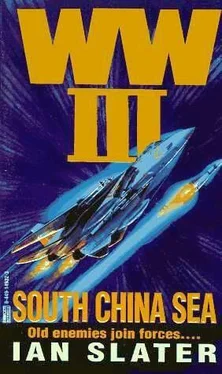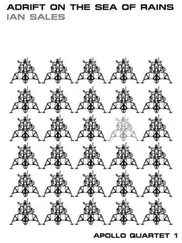He saw the Chinese face flush with anger, and Mellin knew if it hadn’t been for the intervention of whoever it was up on the bridge, he most probably would have been sprawled out again on the deck. The man grunted and, motioning roughly for Mellin to follow him, walked off, his legs perfectly balancing against the yaw and crashing of the ship, Mellin barely able to stand, his legs still feeling rubbery. The next minute he was left staggering like a drunk against the remainder of a huge wave that had hit the ship hard amidships, heavy and billowing spray draining off the superstructure and running down the scuppers like a flash flood. But unexpectedly, Mellin felt much better for the bracing, drenching water. The combination of cold water and fresh salty air partially revived him, and though he still felt woozy, he could feel his whole body benefiting. For the first time in hours, the sinus-stuffing stench of paint and associated odors left him.
Along with the rush of fresh air, he felt more confident, his determination returning, whereas in the stinking forward locker his seasickness had been so acute that all thoughts of the future, let alone hope for it, had vanished. He wasn’t proud of the fact, but then he’d never felt that ill before either. And it was a matter of conditioning. When he’d been a young man in Vietnam as part of the U.S. Special Forces, member of an elite team whose élan was the best possible, he was in top physical condition, and as the rigorous training had toughened his body, it also toughened his confidence.
No matter how hard life had been in the oil business, from the deep freeze of an Oklahoma winter to the sweltering days high atop a deck in the South China Sea, life in the Special Forces had been tougher. And it was this that Mellin was harkening back to — imagining, if only momentarily, he was with his old team in the Delta and that they were watching him now.
Inside the ship he was taken to a small cabin aft of the mess. The cabin was crammed with supplies — cardboard boxes of cans — leaving room for only four men, one wooden stool, and two plastic chairs. The first thing Mellin noticed was how much better the ship was riding amidships than in the gut-wrenching paint locker forward. Though the chairs and the two men in them, both junior officers, threatened to tilt every time the ship rose to meet a new onslaught, the two officers remained all but motionless, letting their feet and legs adapt to the roll and pitch of the ship. The fourth man stood at the door, legs well apart, arms folded, his face larger than most, fat lips tight together, eyes staring. His whole demeanor was a threat, all but daring Mellin to make a try at getting out, though where he could go if he did break out Mellin didn’t know.
“Why,” began the older of the two junior officers, “were you on our reef?”
“Your reef?” Mellin countered.
“All reefs are ours,” said the younger officer, a thin, short, intense man, probably in his mid-twenties.
“All the reefs in the world?” Mellin said.
“In the South China Sea,” said the older, mid-fortyish, and stouter man, whose tone was not nearly as excited, but nevertheless more menacing in its carefully measured cadences, doing battle with the scream of the wind and crashing seas. “We have traditional rights to all the reefs. Chinese fishermen here long before anyone else.”
“Is that right?”
“Yes.”
“How do you know it’s the truth? Could have been any of a dozen nationalities.”
“Chinese were here first,” the older man said.
“So you believe?”
“So we know.”
“So you’ve been told.”
The older man, without turning, said something in Chinese, but Mellin could tell it wasn’t meant for him. He understood the word “now”—they were always telling you “now” in the POW camp. When the older man finished speaking, the heavier man guarding the doorway came quickly to attention and left the cabin. The stout man took a packet of cigarettes and offered one to Mellin.
“No thanks,” Mellin said. The younger, thinner one eyed the pack of cigarettes — Camels — and when he saw his fellow officer take one then put the pack back in his jacket, he took out his own, a red packet of Fight for the People! cigarettes, and sullenly lit one.
“Who,” the older man asked, “discovered America?”
“Christopher Columbus,” Mellin said, nonplussed.
“Huh—” the older man said, blowing out the smoke at Mellin. “So you believe. It could have been any of a dozen nationalities.”
Mellin said nothing.
“Yes, yes,” the younger officer cut in, full of enthusiasm and victory. “Red Indians! Yes. Ah-ha! Yes, Red Indians!”
The door opened and the guard reappeared with a coil of rope and stood behind Mellin. The older officer took another long drag on his cigarette and asked, “What were you doing on the reef?”
“It looked a nice day for a swim. I was shipwrecked — as if you didn’t know.”
“What ship?”
They seemed so intent on knowing the details, Mellin intuitively felt that his refusal to give them answers might be his only chance of survival, remembering how easily the lives of those on the rig had been snuffed out. “Am I under some kind of arrest? If I am, you’d better—”
“You,” the old man said suddenly, “were aboard the drill ship Chical.”
“Was I?”
“Yes,” the younger one chimed in. “On the drill ship Chical.”
Had there been no other survivors? Mellin wondered.
“The drill ship for Chical,” the older officer repeated. “You were working on her — yes?”
Mellin said nothing, and the older officer sighed, nodding at the guard standing behind the American, who now tied Mellin securely to the chair. The guard’s right hand bunched into a fist, and he backhanded Mellin so hard the left-side legs of the chair came off the floor, the whack echoing in the small cabin.
“Were you on the Chical?” the older officer pressed, his creased forehead making it evident that his impatience was mounting. The guard struck again, the blow leaving Mellin with a ringing in his ears so loud that it smothered every other sound. In that moment the point of information as to whether or not Mellin had been on the Chical became academic, the quest for information now becoming a test of wills. The older officer looked tired, the guard watching him attentively, waiting for the order to hit the American again. But instead the older man rose, the younger one following suit, the guard bitterly disappointed.
“Take him back,” the older man ordered, in a tone of finality.
With the younger officer in tow, he left the cabin. The guard untied Mellin as roughly as he could, but left the American’s hands bound behind him and jabbed the prisoner up off the chair.
“Follow me,” the guard ordered, and made his way forward out the door onto the well deck, his lean compensating for the sharp pitching of the ship, the fact that he allowed his prisoner to walk behind instead of in front emphasizing his contempt. The very thought of being taken back to the paint locker churned Mellin’s stomach, his anticipation of the heavy fume-laden locker enough to worsen the pounding of the headache he had from the guard’s blows to his head.
At the door of the paint locker Mellin stopped and turned, waiting for the guard to untie him. The guard merely grinned and shoved Mellin forward, the sill tripping him, causing him to fall headlong into the semidarkness among half-used cans of paint, dirty cleaning rags, and vomit, the nose-plugging smell rising all about him, making it difficult for him to breathe. The dampness above his right eye, blood from a cut, now began to sting, and his body convulsed as he threw up from the nausea brought on by the overwhelming stench of the oil-based paint and urine. He was sure the guard was leaving him tied up contrary to the older officer’s intent but he could do nothing about it, or at least everything that had happened to him conspired to convince him nothing could be done.
Читать дальше












